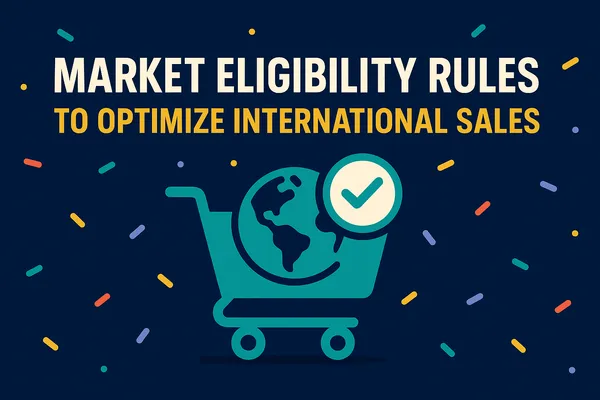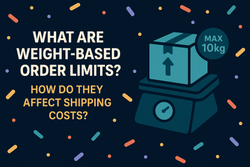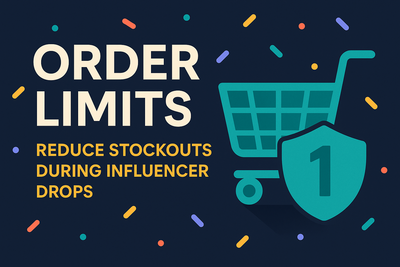Selling across multiple markets can open up new opportunities, but it also adds complexity. Shipping costs, fraud risk, and regional regulations do not affect every country equally. Treating all customers the same does not always make sense.
This is where market eligibility rules come in.
These rules let you control where your order limits apply. Instead of enforcing a single rule across all markets, you can target specific countries or regions based on your goals. This gives you more flexibility to balance profitability, customer experience, and operational load, especially when selling internationally.
When to use market rules (and when not to)
Not every store needs market-specific rules, but for merchants with international traffic, they can be the difference between a smooth operation and one filled with manual adjustments.
Use market eligibility rules when:
- Certain regions come with higher shipping or fulfilment costs
- You want to run a promotion for domestic customers only
- You have had repeat fraud, chargebacks, or support issues from specific countries
- Some products are too fragile or restricted to ship internationally
Avoid market rules when:
- You only sell to one region or do not ship internationally
- You are not sure where most of your traffic or orders are coming from yet
- Your logistics are already segmented using Shopify Markets or other tools
If you are unsure whether market segmentation is right for you, start by reviewing your current sales data and regional performance. From there, you can decide if adding targeted rules will help improve operations or profitability.
Example 1: Limiting order value for new customers in high-risk regions
A consumer electronics brand saw repeated chargebacks from a few specific countries, often tied to high-value guest checkouts. To reduce fraud without blocking entire markets, they made two changes.
First, they required all customers to create an account before checking out. Then, they used Shopify Flow to automatically tag new accounts with "new-customer."
Using DC Order Limits, they created a price limit rule that only applied to new customers in the regions they had flagged. Once a customer completed a legitimate order, another Flow removed the tag, lifting the restriction.
How the rule was set up:
- Rule type: Price Limit
- Limit: Maximum $150
- Product eligibility: All products
- Customer eligibility: Customers tagged with "new-customer"
- Market eligibility: Nigeria, Vietnam, Brazil
- Applies to: Checkout only
This reduced risk on new accounts without affecting returning customers or safe regions.
Example 2: Higher minimums for international orders
A home decor brand was selling globally, but many of their international orders were small and unprofitable. A customer in Europe ordering one eight-dollar candle created more fulfilment cost and shipping overhead than the revenue could cover.
They added a market-specific minimum order quantity that required customers outside the United States to purchase at least three items. The rule applied to all products and was triggered at both the cart and checkout stages.
How the rule was set up:
- Rule type: Quantity Limit
- Limit: Minimum 3
- Product eligibility: All products
- Customer eligibility: All customers
- Market eligibility: All countries except United States
- Applies to: Cart and checkout
Since DC Order Limits does not currently support market exclusions, the merchant manually listed every country they sell to and removed the United States from the list. If you are setting up a similar rule, you can copy and paste the full list below and remove any country you want to exclude:
Full country list for market-based rules
Afghanistan, Albania, Algeria, Andorra, Angola, Antigua and Barbuda, Argentina, Armenia, Australia, Austria, Azerbaijan, Bahamas, Bahrain, Bangladesh, Barbados, Belarus, Belgium, Belize, Benin, Bhutan, Bolivia, Bosnia and Herzegovina, Botswana, Brazil, Brunei, Bulgaria, Burkina Faso, Burundi, Cambodia, Cameroon, Canada, Cape Verde, Central African Republic, Chad, Chile, China, Colombia, Comoros, Congo, Congo, Costa Rica, Croatia, Cuba, Cyprus, Czech Republic, Denmark, Djibouti, Dominica, Dominican Republic, East Timor, Ecuador, Egypt, El Salvador, Equatorial Guinea, Eritrea, Estonia, Eswatini, Ethiopia, Fiji, Finland, France, Gabon, Gambia, Georgia, Germany, Ghana, Greece, Grenada, Guatemala, Guinea, Guinea-Bissau, Guyana, Haiti, Honduras, Hungary, Iceland, India, Indonesia, Iran, Iraq, Ireland, Israel, Italy, Ivory Coast, Jamaica, Japan, Jordan, Kazakhstan, Kenya, Kiribati, South Korea, Kosovo, Kuwait, Kyrgyzstan, Laos, Latvia, Lebanon, Lesotho, Liberia, Libya, Liechtenstein, Lithuania, Luxembourg, Madagascar, Malawi, Malaysia, Maldives, Mali, Malta, Marshall Islands, Mauritania, Mauritius, Mexico, Micronesia, Moldova, Monaco, Mongolia, Montenegro, Morocco, Mozambique, Myanmar, Namibia, Nauru, Nepal, Netherlands, New Zealand, Nicaragua, Niger, Nigeria, North Macedonia, Norway, Oman, Pakistan, Palau, Panama, Papua New Guinea, Paraguay, Peru, Philippines, Poland, Portugal, Qatar, Romania, Russia, Rwanda, Saint Kitts and Nevis, Saint Lucia, Saint Vincent and the Grenadines, Samoa, San Marino, Sao Tome and Principe, Saudi Arabia, Senegal, Serbia, Seychelles, Sierra Leone, Singapore, Slovakia, Slovenia, Solomon Islands, Somalia, South Africa, South Sudan, Spain, Sri Lanka, Sudan, Suriname, Sweden, Switzerland, Syria, Taiwan, Tajikistan, Tanzania, Thailand, Togo, Tonga, Trinidad and Tobago, Tunisia, Turkey, Turkmenistan, Tuvalu, Uganda, Ukraine, United Arab Emirates, United Kingdom, United States, Uruguay, Uzbekistan, Vanuatu, Vatican City, Venezuela, Vietnam, Yemen, Zambia, Zimbabwe
This change helped them filter out unprofitable international orders while keeping everything open for domestic customers.
Use market rules to stay flexible
Market eligibility rules are not just about blocking issues. They are a tool for focus. Whether you are testing a promotion, launching in new regions, or adjusting for cost differences, these rules give you an extra layer of control without adding friction for the right customers.
With DC Order Limits, you can create rules that apply to specific countries or regions in just a few clicks. Use them to make smarter decisions, save time, and grow more confidently.









